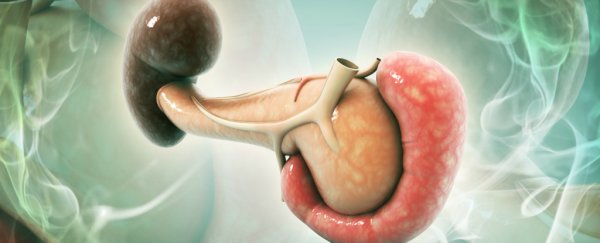Losing a single gram of fat could be enough to reverse the symptoms of type 2 diabetes – as long as that fat comes from the pancreas, researchers in the UK have shown.
It's already known that weight loss can greatly help manage type 2 diabetes – a progressive condition where the body either stops being able to produce enough insulin, or becomes insensitive to it – but this is the first time that researchers have shown the exact type of weight loss that's needed to get the condition under control.
The study followed 18 obese participants with type 2 diabetes both before and after gastric bypass surgery. Using a super sensitive MRI scan, the researchers revealed that the diabetics had abnormally high levels of fat built up in their pancreas – the insulin-producing organ – even when compared to other obese people without type 2 diabetes.
But the surgery helped them to burn off that fat, restoring their insulin levels to normal and allowing them to come off their medication.
The results suggest that excess fat in the pancreas is specific to type 2 diabetes, and is somehow clogging up the normal release of insulin.
"When that excess fat is removed, insulin secretion increases to normal levels," a Newcastle University press release explains. "In other words, they were diabetes free."
It's a pretty incredible discovery, but unfortunately it's not as simple as just losing a little bit of weight and choosing where it comes from.
"If you ask how much weight you need to lose to make your diabetes go away, the answer is 1 gram! But that gram needs to be fat from the pancreas," said lead researcher Roy Taylor. "At present the only way we have to achieve this is by calorie restriction by any means – whether by diet or an operation."
What's particularly interesting is that the researchers also compared the diabetics' results to those of nine people without type 2 diabetes who also underwent gastric bypass surgery.
After the surgery, all the participants lost the same amount of weight – around 13 percent of their original body weight – but there was a big different in where that fat had come from.
In the non-diabetics who had never had elevated fat levels in their pancreas in the first place, the amount of fat in the organ stayed the same. But the participants with type-2 diabetes lost on average 1.2 percent fat from the organ, which took them back down to healthy levels.
Following the surgery the diabetics came off their medication, and, incredibly, their insulin secretion levels returned to normal.
"For people with Type 2 diabetes, losing weight allows them to drain excess fat out of the pancreas and allows function to return to normal," said Taylor.
The sample size was only small, so the results will need to be replicated in a larger group of participants, and more research is needed to look into how long the diabetes symptoms stay away following pancreas fat loss.
But the results are incredibly promising, and provide scientists with important insight into how to treat the type 2 diabetes, which now affects 9 percent of the global population.
"The decrease in pancreas fat is not simply related to the weight loss itself. It is not something that might happen to anyone whether or not they had diabetes. It is specific to Type 2 diabetes," said Taylor. "What is interesting is that regardless of your present body weight and how you lose weight, the critical factor in reversing your Type 2 diabetes is losing that 1 gram of fat from the pancreas."
The research has been published in the journal Diabetes Care.
